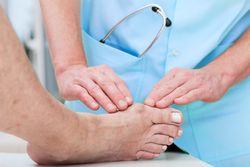How Do Diabetic Foot Ulcers Develop?

Diabetes can be a difficult disease to manage, especially since it can impact your body’s natural ability to heal itself. Unfortunately, diabetics are prone to health problems like diabetic foot ulcers, which can be dangerous to your overall health and make it difficult to get around. Here is a little more information about these painful lesions, and how you can prevent problems.
A Guide to Diabetic Foot Ulcers
How Do Ulcers Develop?
Diabetes can cause soft tissue to break down, a problem that is especially common in high-pressure areas, such as between your toes, along your heels, and on the soles of your feet. Poor circulation, high blood sugar, nerve damage, or foot irritation can cause ulcers, which start as a black eschar, or dead tissue, surrounding a lesion.
 Since your feet are furthest from your heart, it can be difficult for them to receive the blood flow they need to heal, resulting in an open wound. Unfortunately, since diabetics can also suffer from nerve damage, they may not be able to feel the ulcer, which can cause neglect that can spark a serious infection.
Since your feet are furthest from your heart, it can be difficult for them to receive the blood flow they need to heal, resulting in an open wound. Unfortunately, since diabetics can also suffer from nerve damage, they may not be able to feel the ulcer, which can cause neglect that can spark a serious infection.
How Can You Prevent Problems?
To prevent foot ulcers from forming, do everything you can to control your blood sugar levels properly. By making sure your sugars stay under control, you can prevent nerve damage and tissue problems, paving the way for healthier feet. Additionally, maintain good personal hygiene, cleaning between your toes and under your feet when you shower. Wear shoes and socks that fit correctly, and keep your weight within a healthy range to prevent the formation of diabetic foot ulcers.
If you are faced with diabetic foot ulcers, reach out to Advanced Varicose Vein Treatments of Manhattan for treatment. With a commitment to using the latest technology and treating every patient with the kindness and respect they deserve, this practice has helped patients throughout New York City and the surrounding area find the relief they need. To find out more about how they can help, turn to their website, or schedule a consultation by calling (888) 356-8346.
About the Business
Have a question? Ask the experts!
Send your question

